Key takeaways:
- Marketing consulting requires building relationships and understanding client stories for innovative solutions.
- Brand evolution is essential for resilience and emotional connection with customers, keeping brands relevant in competitive markets.
- Consistency across platforms and the use of customer feedback are crucial for effective branding strategies and enhancing customer loyalty.
- Authenticity and openness to feedback are vital in personal branding, leading to stronger audience connections and evolving narratives.
Author: Evelyn Harper
Bio: Evelyn Harper is an award-winning author known for her captivating novels that explore the complexities of human relationships and the beauty of everyday life. With a background in psychology and a passion for storytelling, she weaves intricate narratives that resonate with readers around the globe. Evelyn’s work has been featured in numerous literary magazines, and her debut novel was listed as a bestseller. When she’s not writing, she enjoys hiking in the mountains of her home state, Oregon, where she draws inspiration from nature and the world around her.
Understanding Marketing Consulting
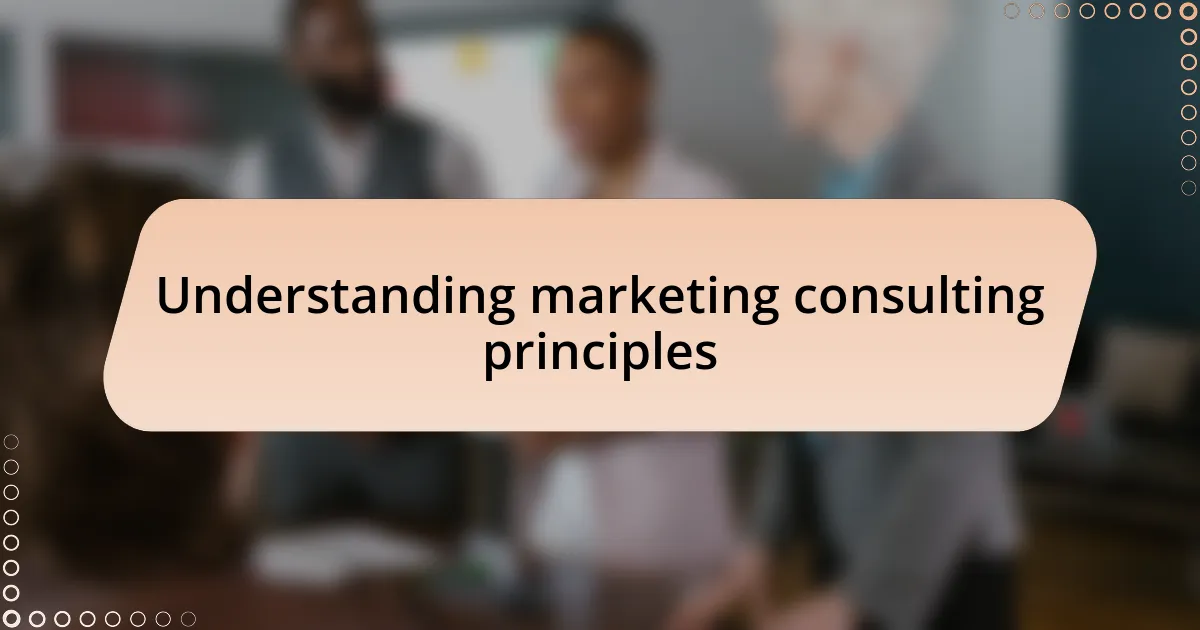
Marketing consulting is a nuanced field that thrives on understanding the unique challenges businesses face. I remember when I first dived into this world; it was like peeling an onion—each layer revealed new insights about consumer behaviors and market trends. Have you ever wondered what it feels like to connect the dots between a product and its ideal customer?
In my years of experience, I’ve seen how effective marketing strategies can transform a struggling brand into a market leader. It’s not just about crafting the perfect ad or social media post; it’s about aligning those efforts with a company’s core values and mission. Can you envision the excitement of seeing tangible results from a strategy you helped design?
At its core, marketing consulting is about building relationships—both with clients and their target audiences. I’ve often found that when I listen deeply to a client’s story, it opens up pathways to innovative solutions. Isn’t it fascinating how authentic connections can spark creativity and drive business growth?
Importance of Brand Evolution
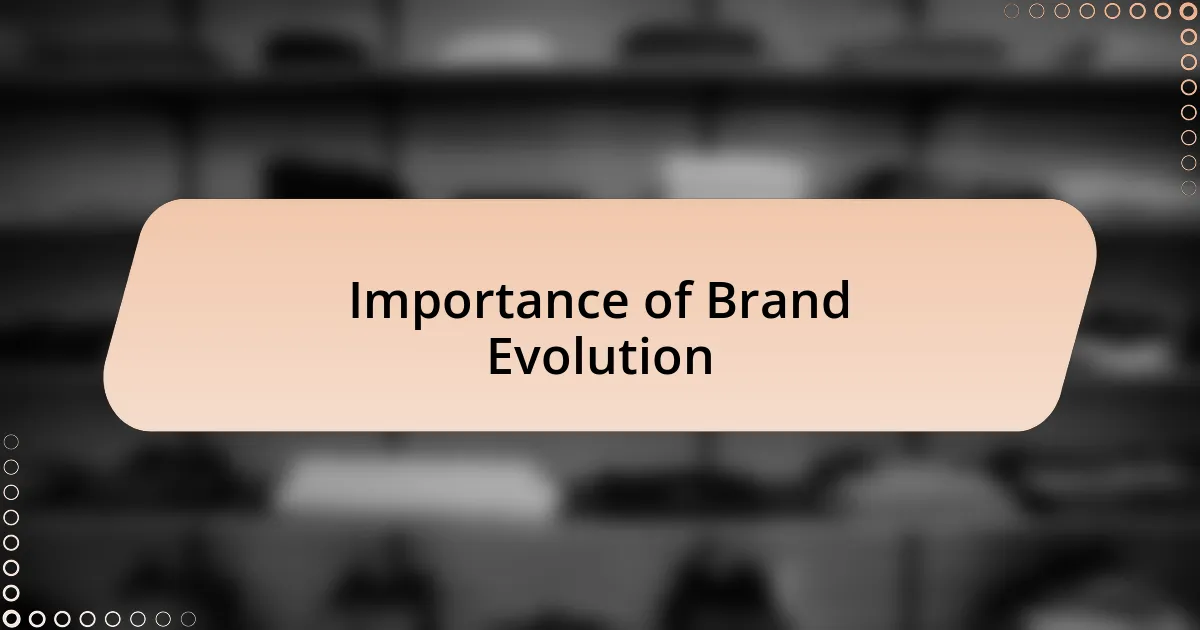
To stay relevant in today’s fast-paced market, evolving your brand is crucial. I once worked with a client whose logo hadn’t changed in over a decade. When we revamped it, the reaction was overwhelming; customers felt rejuvenated and engaged, demonstrating how fresh branding can breathe new life into a business.
Brand evolution fosters resilience. I remember a period when a competitor launched a disruptive product, and the old branding strategies just didn’t resonate anymore. By embracing change and innovating our messaging, we not only kept our existing customers but attracted a new audience that was eager for modern solutions.
Moreover, there’s an emotional aspect to brand evolution. I’ve seen clients struggle with change, yet when they embraced it, the transformative journey was palpable. Have you felt that rush of excitement and fear when confronting change? It’s that delicate balance that can elevate a brand from stale to spectacular, creating a narrative customers want to be part of.
Key Strategies for Branding
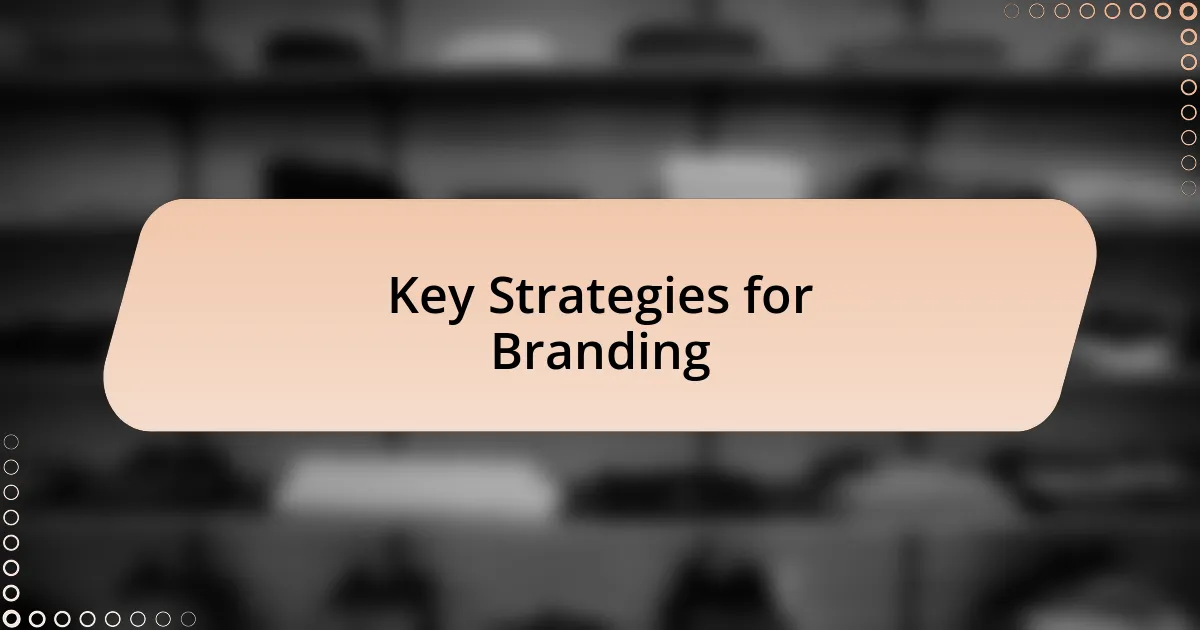
One of the key strategies for branding is consistency across all platforms. I remember a time when I noticed a client’s messaging on social media didn’t match their website, which confused potential customers. By aligning their tone, visuals, and values everywhere, we created a strong, cohesive presence that built trust and familiarity. Have you ever been drawn to a brand because everything just felt right together?
Another effective strategy involves understanding and leveraging customer feedback. Early in my career, I hesitated to act on a negative review. However, after addressing the issue directly, we not only repaired that relationship but also learned valuable insights that informed our branding decisions moving forward. This experience taught me how listening to the audience can not only enhance your brand but also deepen customer loyalty. Has there been a time when feedback reshaped how you viewed your own brand?
Lastly, storytelling should be at the heart of your branding approach. I’ve crafted compelling narratives for clients that resonate emotionally with their audience. One compelling story can capture a brand’s essence and mission, allowing customers to connect on a personal level. How powerful would it be if your brand’s journey became part of your customers’ lives? This strategy transforms branding from merely transactional to relational, encouraging a lasting emotional investment.
Measuring Brand Success

Measuring brand success goes beyond just tracking sales; it’s about understanding how your brand resonates with your audience. I’ve often turned to metrics like customer engagement and social media interactions to get a clearer picture of my brand’s impact. For example, when I noticed a spike in comments and shares on a particular campaign, it made me realize that our message really hit home. Have you ever experienced a moment where the response from your audience truly validated your branding efforts?
Another aspect that’s crucial in measuring success is monitoring brand perception over time. In one instance, I initiated a survey to gauge how clients viewed my services. The resulting insights were eye-opening; some aspects of my brand were perceived completely differently than I had imagined. This moment reminded me that perception can significantly shape success. Have you taken the time to find out how your audience really sees your brand?
Finally, tracking net promoter score (NPS) can be a revealing way to assess customer loyalty. I once implemented NPS surveys after a significant product launch, and the feedback was enlightening. Not only did it help identify our dedicated advocates, but it also highlighted areas needing improvement. This practice underscored for me that loyal customers are not just a metric; they represent the heartbeat of your brand. How do you currently measure the loyalty of your customers?
Personal Branding Journey
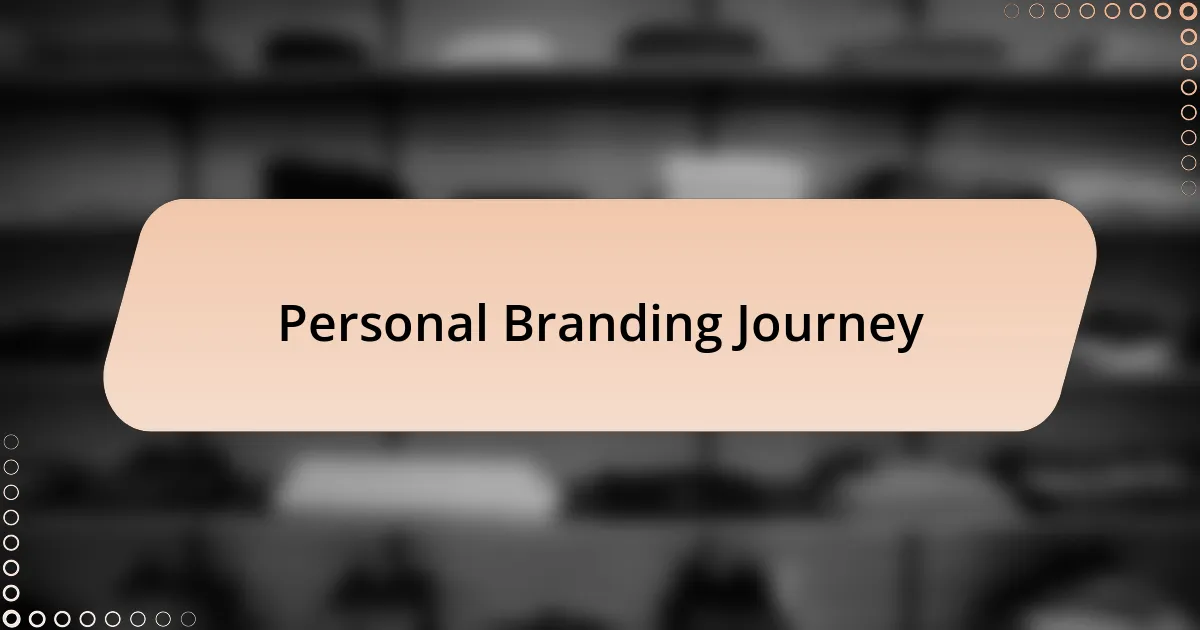
In my personal branding journey, I’ve discovered that authenticity is vital. When I first started establishing my brand, I focused on what I thought others expected rather than who I truly was. It took me some time to realize that sharing my genuine self, including my struggles and victories, resonated much more with my audience. Have you ever found that being real and vulnerable creates a stronger connection with your followers?
As I navigated through various platforms and networking events, I learned that consistency plays a crucial role in personal branding. I still remember a moment at a conference when someone approached me and said they felt they already knew me from my online content. It dawned on me that cultivating a cohesive presence across all channels was not just beneficial—it was necessary. Are you putting in the effort to ensure that your messaging and visuals are aligned everywhere you engage with your audience?
Another pivotal experience was when I started to embrace feedback more openly. Initially, criticism felt daunting, yet I began to view it as critical data for evolving my brand. One particular comment from a follower pushed me to refine my communication style, leading to a more engaging narrative that my audience truly appreciated. Have you ever experienced a moment where feedback transformed your approach to branding?
Tools for Brand Development
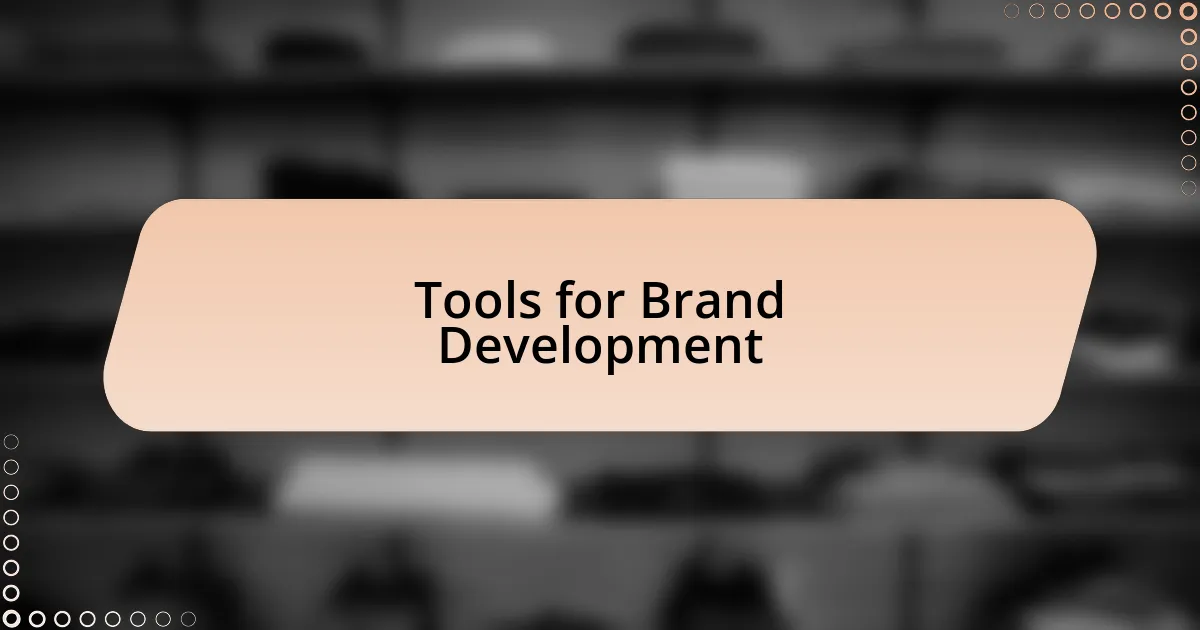
When it comes to tools for brand development, I find that utilizing social media analytics is incredibly insightful. Early in my journey, I used platforms like Instagram and Facebook to gauge what content truly resonated with my audience. I remember a time when I tweaked my posting schedule based on engagement metrics, and the result was a significant boost in interaction. Have you ever analyzed your own posts to see which ones hit home the hardest?
Another vital tool I’ve leaned on is a brand guideline document. This was a game-changer for me. I began by outlining my brand values, voice, and visual aesthetic in a structured way. It felt like having a compass that guided my decisions whenever I created content or collaborated with others. Have you ever thought about how a well-defined brand guideline could streamline your creative process?
Moreover, I regularly use brand storytelling techniques to forge deeper connections with my audience. Crafting narratives around my experiences not only humanized my brand but also made it relatable. There was a project where I shared a personal challenge and how it shaped my approach to marketing, which sparked conversations and connections I hadn’t anticipated. Isn’t it fascinating how a good story can bridge gaps and build relationships in the branding world?
Lessons Learned from Brand Evolution
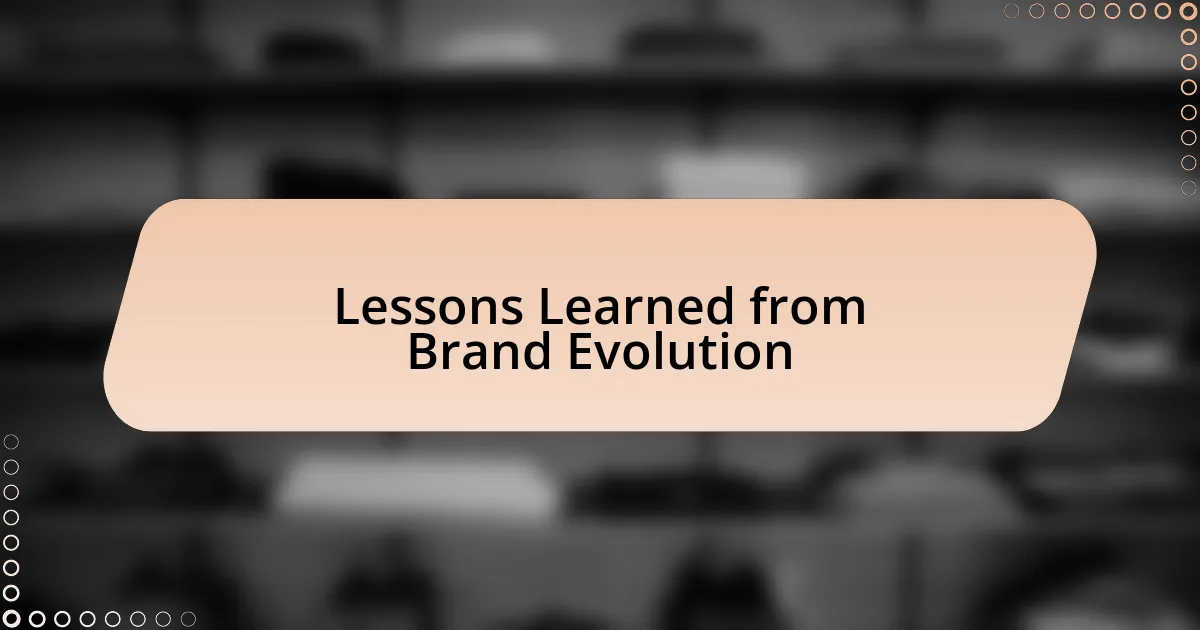
The journey of brand evolution has taught me that flexibility is key. There was a time when I held onto a rigid vision for my brand. However, after receiving feedback from my audience, I realized that adapting was essential for staying relevant. Have you ever felt the pressure to stay the course, only to find that openness to change led to unexpected growth?
One crucial lesson I’ve learned is the importance of consistency. Early on, I experimented with different tones and visuals, but it became evident that inconsistency diluted my brand’s message. I recall a point when I streamlined my messaging across platforms, which not only reinforced my identity but also helped my audience recognize and remember me better. How often do you reflect on whether your brand message is clear and consistent?
Lastly, my experiences have highlighted that staying true to my core values during brand evolution is non-negotiable. There was a period when I considered pivoting too far away from my roots to chase trends, but I quickly realized that authenticity resonates deeply. It reminded me of the old adage: just because something is trendy doesn’t mean it aligns with who you are. This realization has kept me grounded and has fostered a loyal audience that trusts my brand. Have you checked in with your values lately?